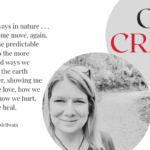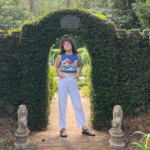As writers, we’re often asked about what inspired a piece, what outside stimulus provided the germ, the grist, or the spark for a first draft. Even the word inspiration, from the Latin inspīrār (to blow or breathe into), implies an agency without rather than within the artist, as if we were nothing more than receptacles for the generative murmurings of the muse. When we asked 11.1 poet-contributors about what occasioned their poems, we received some answers that made us reconsider such assumptions. While Francesca Abbate and Martha Silano discovered source texts in more conventional places (Abbate in a lesser-known figure of Greco-Roman myth, Silano in a famous painting by Georgia O’Keeffe), both poets repurposed these influences to fit their own needs. Hailey Leithauser and Nance Van Winckel mined their own memories for source material, drawing upon remarkable interactions between people witnessed while having drinks or dining out. Read on to find out how our poets incorporated these “texts” into some of the most inspiring work we’ve published in our pages to date.
 Francesca Abbate on “You Can’t Teach a Pig to Sing”: My homeroom teacher in high school really did have a cartoon taped to his podium with a similar caption. Maybe the caption was closer to Mark Twain’s quote—“Never try to teach a pig to sing. It wastes your time and annoys the pig”—but at this distance—thirty years—the details are a bit sketchy. I thought of my homeroom teacher as a desperately bitter man. He taught English, and I may have come to appreciate him had I had an actual class with him. In the poem’s world, he’s Not Baby’s mother’s teacher. Not Baby, also known as Melinoe, is Persephone’s daughter by Zeus. The story goes that Zeus disguised himself as Persephone’s husband Hades, which makes more sense than Hades being the father of anything. When Melinoe wandered the earth at night with her retinue of ghosts, she brought nightmares to sleepers and made dogs bark for no discernible reason. Her job was to escort the souls of the newly dead to the Underworld, hence the Eleusinian mysteries depicted in the fresco in Pompeii. This project has been plagued by coincidence: I was reading Mary Beard’s The Fires of Vesuvius: Pompeii Lost and Found when the pigs in the poem met their demise. Not Baby/Melinoe used to be a bartender, but has now joined the “daylight” world. Depressed, displaced, and reading Montaigne and Lucretius (etc.), she’s grappling with the question of how a woman searching for, and finding, solace in history can relate to her exclusion from it. Not Baby—the nickname—was born of a typo for Nobody. I was transcribing an article regarding a body found on a trail that I bike on. “Nobody,” initially, seemed to know who the woman was.
Francesca Abbate on “You Can’t Teach a Pig to Sing”: My homeroom teacher in high school really did have a cartoon taped to his podium with a similar caption. Maybe the caption was closer to Mark Twain’s quote—“Never try to teach a pig to sing. It wastes your time and annoys the pig”—but at this distance—thirty years—the details are a bit sketchy. I thought of my homeroom teacher as a desperately bitter man. He taught English, and I may have come to appreciate him had I had an actual class with him. In the poem’s world, he’s Not Baby’s mother’s teacher. Not Baby, also known as Melinoe, is Persephone’s daughter by Zeus. The story goes that Zeus disguised himself as Persephone’s husband Hades, which makes more sense than Hades being the father of anything. When Melinoe wandered the earth at night with her retinue of ghosts, she brought nightmares to sleepers and made dogs bark for no discernible reason. Her job was to escort the souls of the newly dead to the Underworld, hence the Eleusinian mysteries depicted in the fresco in Pompeii. This project has been plagued by coincidence: I was reading Mary Beard’s The Fires of Vesuvius: Pompeii Lost and Found when the pigs in the poem met their demise. Not Baby/Melinoe used to be a bartender, but has now joined the “daylight” world. Depressed, displaced, and reading Montaigne and Lucretius (etc.), she’s grappling with the question of how a woman searching for, and finding, solace in history can relate to her exclusion from it. Not Baby—the nickname—was born of a typo for Nobody. I was transcribing an article regarding a body found on a trail that I bike on. “Nobody,” initially, seemed to know who the woman was.
Hailey Leithauser on “Overheard at the Blue Moon”: One night several years ago as a friend and I were standing at the bar of a restaurant waiting for our table, we overheard two women talking about a third woman they knew and whom they had seen on their way in. They were speculating about whom she might be meeting—was she seeing someone new, was it this person or that, everyone knew she’d had a thing for so-and-so for years, and then there was another so-and-so everyone knew had a thing for her, or maybe she was getting back with her ex who was no good. What a terrible idea that would be.
As the speculation ranged over a lengthening list of scenarios, the conversation became so interesting that when it finally came time for us to go into the restaurant, we spent the entire meal looking from couple to couple trying to guess who “she” was and which of her potential lovers she had chosen.
 That is one explanation for how the poem was written. Another explanation is that I didn’t overhear a conversation at all; it was my friend and I who had the discussion about someone we knew, but I changed it to make the poem more interesting.
That is one explanation for how the poem was written. Another explanation is that I didn’t overhear a conversation at all; it was my friend and I who had the discussion about someone we knew, but I changed it to make the poem more interesting.
Or another explanation—I was alone at the time, and all of this speculation went on inside my own head.
Or maybe there never was a woman at all, and I just liked the sound of the first three lines. Perhaps they came to me in the tub, or walking my dog or waking up from a dream. As the poem says, anything (and everything) is possible.
Martha Silano on “The World”: This poem began while I was in residence at one of my favorite places on Earth—a scholarly retreat center located on a small island in Northern Puget Sound. I’d brought a notebook with a quote from Georgia O’Keeffe scrawled inside. She said it was the unexplainable in nature that made the world feel big, far beyond her understanding. When I sat down to write this poem, I put that quote at the top of the page and began attempting the impossible: to express my awe about this place where we live. I was also thinking about my son. As the poem revved up and began to find its footing, my son and the world were both there on the page—but as two separate entities. Once the engine was humming, I relished choosing the most alliterative and slant-rhyme-y ways to describe my favorite sphere—huge and minuscule, silent and loud, what and how it spews. Turning Earth into a twelve-year-old boy didn’t occur to me in the first or tenth or twentieth pass, but much later, while working in a room along the Seine River. In a trance-like state, my fingers flying over the keys, boy and World became one. Georgia O’Keeffe’s Pelvis IV provided the final image, followed by a series of “f” words I have always enjoyed on the tongue.
Nance Van Winckel on “Fist”: In a restaurant, a person in our group of ten slammed his fist on the table to make a point. The sound of it brought back to me in a very sensory way—the rattling glasses, the echo, the jarring movement of the table—this manner of taking control that was something my stepdad did. Aside from him, the table in my girlhood home was all women, and we could indeed become boisterous. His fist banging down was his way of diverting our attention to him. Even all these years after his death, it’s odd and often a bit disconcerting that when a fist pounds down, I think of him. I think of the power in that fist, and increasingly (in light of continuing conflicts in the world) that power feels larger than one person; it feels quite masculine, primitive, and endless.


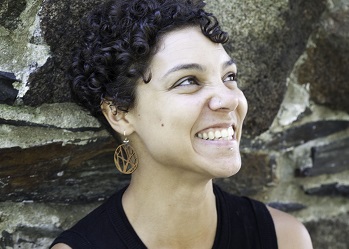
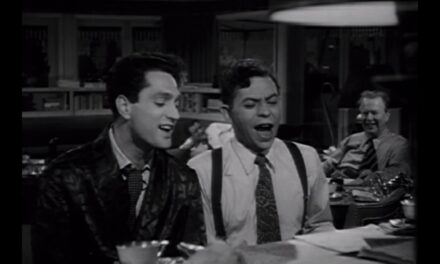
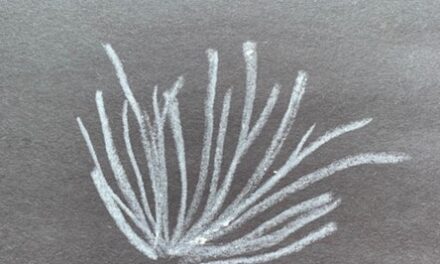
![Katie Berta on Her Poem “[To be a child again.]”](https://www.cincinnatireview.com/wp-content/uploads/2022/12/Berta-house-440x264.jpg)



